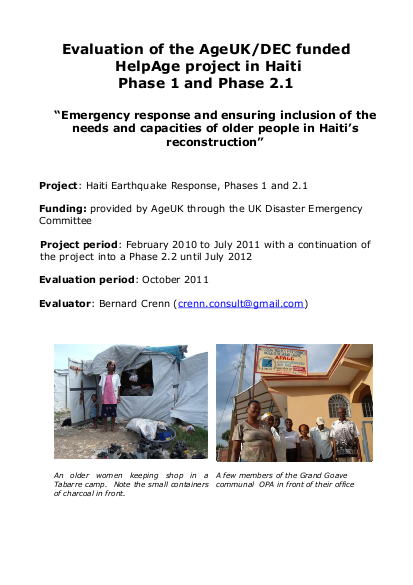
Following the earthquake of January 2010, the emergency response in Haiti has been particularly difficult due to the intensity of the disaster in a long term environmentally, educationally, economically and governance impoverished nation and which also directly affected those responsible for the response. HelpAge had had a regionally managed very small presence in Haiti for a year when the emergency shifted the management of the Haiti intervention to HelpAge’s World Wide Emergency department.
Traditionally, DEC funding covers two phases of an emergency, Phase 1 for 6 months and a Phase 2 for up to one year. Due to the large quantity of funds raised, the Haiti response included a third phase, also for up to a year. HelpAge submitted proposals for each phase for a total of 30 months. This evaluation occurred during the 20th month and is effectively a midterm evaluation of what started as an emergency response but has evolved into a recovery and development phase as HelpAge intends to remain active in Haiti after the DEC response.
Phase 1, which ran for 6 months between February and July 2010 provided critical relief services to 24,000 OPs in 212 IDP ‘camps’ (out of the nearly 2,000) and to 417 OPs in the area’s 8 nursing homes. The effort cost £816,874 from the DEC and £1,074,016 from other sources and concentrated on the delivery of food and NFIs, appropriate healthcare including mental health/psychosocial support and home care and support. This also included the production and broadcasting of radio programs, the training of medical and paramedical staff on OP care and distribution of 5,300 ToughStuff solar kits.
Phase 2.1 ran for 12 months between August 2010 and July 2011 and provided post relief services to more than 12,000 OPs in 68 camps in 12 communes through the creation of 101 OPAs and the use of 203 community HBCs. The effort cost £2,174,700 from the DEC and £43,988 from other sources and concentrated on the 3 objectives of providing increased protection and empowerment to advocate for OP rights and most pressing needs, improving OP livelihoods primarily through cash transfers and access to appropriate healthcare including mental health support primarily through contracted service providers. Additional activities included additional radio and TV programming, the distribution of 6,655 mobile phones, more training (DRR, psycho-social) and access to transitional shelters.
Phase 2.2 is underway for 12 months between August 2011 and July 2012 and has for objectives to strengthen and increase the self-reliance the OPAs, to increase the training, networking, advocating for and supporting of DRR activities, and access to shelter, healthcare and legal services. This includes the distribution of 3,634 additional ToughStuff kits. The evaluation lasted one month and is based on the information acquired from project documentation, 171 sampled beneficiaries in and around camps in 4 localities, attendance at a day-long joint meeting of all the OPA committees, 4 focus group discussions with OPA committees, 6 FGD with OPA members, 7 HelpAge Haiti staff, 8 staff from the HelpAge London office and 6 external key informants in Haiti, 5 direct observations at OPA offices and in one camp.
Resource collections
- Evaluating humanitarian action
- Monitoring of humanitarian action
- Topics
- UN Habitat - Urban Response Collection
- Urban Response - Urban Crisis Preparedness and Risk Reduction
- Urban Response Collection - Community Engagement and Social Cohesion
- Urban Response Collection - Economic Recovery
- Urban Response Collection - Environment and Climate Change
- Urban Response Collection - Housing, Land and Property
- Urban Response Collection - Urban Crisis Response, Recovery and Reconstruction
- Urban Response Collection - Urban Resilience
